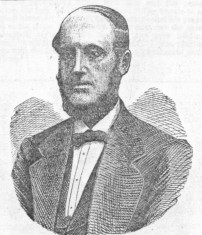Henry Bird (chess player)

Henry Edward Bird (July 14, 1830 – April 11, 1908) was an English chess player and chess writer. He was born in Portsea in Hampshire.
Chess career
At age 21 Bird was invited to the first international tournament, London 1851. He also participated in tournaments held in Vienna and New Jersey. In 1858 he lost a match to Paul Morphy at the age of 28, yet he played high-level chess for another 50 years. Although Bird was a practicing accountant, not a professional chess player, it has been said that he "lived for chess, and would play anybody anywhere, any time, under any conditions."[1] In the New York tournament of 1876, Bird received the first brilliancy prize ever awarded, for his game against James Mason.[1]
In 1874 Bird proposed a new chess variant, which played on an 8x10 board and contained two new pieces, guard (combining the moves of the rook and knight) and equerry (combining the bishop and knight). Bird's chess inspired Capablanca to create another chess variant, Capablanca chess, which differs from Bird's chess only by starting position.
Bird was also an outstanding author and accountant. He wrote a book on chess entitled Chess History and Reminiscences. He also wrote a book entitled An Analysis of Railways in the United Kingdom.
It was Bird who popularized the chess opening now called Bird's Opening (1. f4), as well as Bird's Defense to the Ruy Lopez (1.e4 e5 2.Nf3 Nc6 3.Bb5 Nd4). Bird's Opening is considered sound, though not the best try for an opening advantage. Bird's Defense is regarded as slightly inferior, but "trappy".
Bibliography
- Bird, Henry Edward. The Chess openings Considered Critically and Practically (London: Dean, 1877)
- Bird, Henry. Chess Masterpieces (London: 1875)
- Bird, Henry. Chess History and Reminiscences (London: 1893)
- Bird, Henry. Modern Chess
- Bird, Henry. Chess for Beginners
- Bird, Henry. Chess Novelties (London: 1895)
See also
Notes
References
- Hooper, David; Whyld, Kenneth (1992), The Oxford Companion to Chess (second ed.), Oxford University Press, ISBN 0-19-280049-3, OCLC 34618196
External links
- Henry Bird player profile and games at Chessgames.com
- Henry Bird download 22 of his games in pgn format.
- Chess History and Reminiscences - the full text of Bird's book on chess history
- Works by Henry Bird at Project Gutenberg
- Statistics at ChessWorld.net
- Henry Edward Bird
